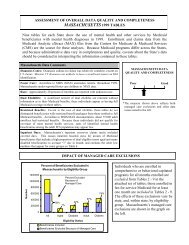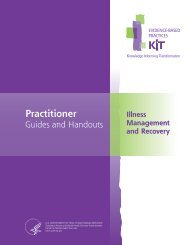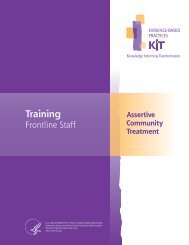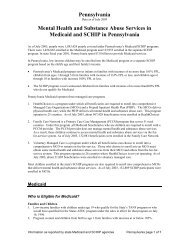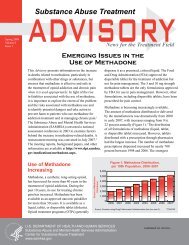Practice Guidelines: Core Elements for Responding to Mental Health
Practice Guidelines: Core Elements for Responding to Mental Health
Practice Guidelines: Core Elements for Responding to Mental Health
Create successful ePaper yourself
Turn your PDF publications into a flip-book with our unique Google optimized e-Paper software.
II. respondIng <strong>to</strong> a mental health CrIsIs<br />
ten essentIal values<br />
Ten essential values are inherent in an appropriate crisis response, regardless of the<br />
nature of the crisis, the situations where assistance is offered or the individuals providing<br />
assistance:<br />
1. Avoiding harm. Sometimes mental health crises place the safety of the person,<br />
the crisis responders or others in jeopardy.An appropriate response establishes<br />
physical safety, but it also establishes the individual’s psychological safety. For<br />
instance, restraints are sometimes used in situations where there is an immediate<br />
risk of physical harm, yet this intervention has inherent physical and psychological<br />
risks that can cause injury and even death. Precipi<strong>to</strong>us responses <strong>to</strong> individuals in<br />
mental health crises—often initiated with the intention of establishing physical<br />
safety—sometimes result in harm <strong>to</strong> the individual. An appropriate response <strong>to</strong> mental<br />
health crises considers the risks and benefits attendant <strong>to</strong> interventions and whenever possible<br />
employs alternative approaches, such as controlling danger suffciently <strong>to</strong> allow a period of<br />
“watchful waiting.” In circumstances where there is an urgent need <strong>to</strong> establish physical<br />
safety and few viable alternatives <strong>to</strong> address an immediate risk of significant harm <strong>to</strong> the<br />
individual or others, an appropriate crisis response incorporates measures <strong>to</strong> minimize the<br />
duration and negative impact of interventions used.<br />
“To promote patient-centered<br />
care, all parties involved in<br />
health care <strong>for</strong> mental or substance-use<br />
conditions should<br />
support the decision-making<br />
abilities and preferences <strong>for</strong><br />
treatment and recovery of persons<br />
with mental/substance<br />
use problems and illnesses”<br />
Institute of Medicine (2006) Committee on Crossing<br />
the Quality Chasm: Adaptation <strong>to</strong> <strong>Mental</strong> <strong>Health</strong> and<br />
Addictive Disorders, Recommendation 3-1, p. 126<br />
t<br />
2. intervening in Person-centered ways.<br />
<strong>Mental</strong> health crises may be routine in some<br />
settings and, perhaps, have even come <strong>to</strong> be<br />
routine <strong>for</strong> some people with serious mental<br />
health or emotional problems. Nevertheless,<br />
appropriate crisis assistance avoids rote<br />
interventions based on diagnostic labels,<br />
presenting complaint or practices cus<strong>to</strong>mary<br />
<strong>to</strong> a particular setting. Appropriate interventions<br />
seek <strong>to</strong> understand the individual, his or her unique<br />
circumstances and how that individual’s personal<br />
preferences and goals can be maximally incorporated<br />
in the crisis response.<br />
3. shared responsibility. An acute sense of losing control over events or feelings<br />
is a hallmark of mental health crises. In fact, research has shown “feeling out of<br />
control” <strong>to</strong> be the most common reason consumers cite <strong>for</strong> being brought in <strong>for</strong><br />
psychiatric emergency care. 12 An intervention that is done <strong>to</strong> the individual—<br />
rather than with the individual—can rein<strong>for</strong>ce these feelings of helplessness. One<br />
of the principal rationales <strong>for</strong> person-centered plans is that shared responsibility<br />
promotes engagement and better outcomes.While crisis situations may present<br />
challenges <strong>to</strong> implementing shared, person-centered plans, ultimately an<br />
intervention that considers and, <strong>to</strong> the extent possible, honors an individual’s role<br />
in crisis resolution may hold long-term benefits. An appropriate crisis response seeks<br />
<strong>to</strong> assist the individual in regaining control by considering the individual an active partner<br />
in—rather than a passive recipient of—services.<br />
5



